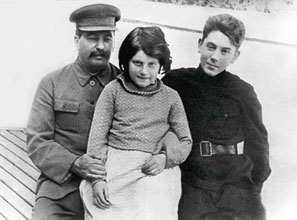
Children of Monsters: An Inquiry into the Sons and Daughters of Dictators by Jay Nordlinger (Encounter, 336 pp., $25.99)
When it comes to twentieth-century monsters, Adolf Hitler will always be first-among-equals. Mao Tse Tung and Josef Stalin may have killed more people, but Hitler has become a byword for dead-eyed evil. Perhaps this is so because Hitler had no children to humanize him. Or did he? In Jay Nordlinger’s new book, Children of Monsters, we meet Jean-Marie Loret, a Frenchman who believed his mother and Hitler had a brief, yet productive, affair during World War I. Loret had an unhappy life. He was tormented by the burden of what he believed to be his ancestry. Oddly, the torment did not prevent him from growing a Hitler-style mustache.
Original in concept and packed with details, Nordlinger’s book offers a worthwhile climb down the family trees of the twentieth century’s most notorious dictators. Vasily Stalin behaved like a little tyrant, yet correctly predicted that after his father’s death, “Khrushchev, Beria, [and] Bulganin’ll tear me apart.” Vasily was indeed thrown in jail, forced to confess to spreading anti-Soviet propaganda—a favorite tactic of his father—and died of alcoholism at the age of 41. Vasily’s older brother, Yakov, served with the Red Army during World War II, was captured, and thrown in a Nazi prison camp, where he committed suicide on an electric fence. Svetlana Stalin grew up with rumors of her father’s involvement in her mother’s death. Schoolmates would pass her notes requesting intercession with her father on behalf of missing family members. She saw aunts and uncles purged and lost a lover to the gulag. After two failed marriages, she defected to America.
Some descendants of dictators are quite proud of the family name. The Mussolini children and grandchildren display a vivacious Italian attitude, retaining Il Duce’s legendary machismo. By contrast, Bettina Goering, the grand-niece of the German Reichsmarshall, had herself sterilized so that the family line would come to an end. Many of the children and grandchildren of dictators have entered politics themselves, often with revanchist or neo-fascist platforms. Several became architects and engineers. The daughter of Pol Pot, the man who executed educated Cambodians (identified by their eyeglasses), became an accountant and later earned a master’s degree in English literature. (Theodore Dalrymple’s Utopias Elsewhere is a well-matched companion book, offering a travel guide through the lands once terrorized by many of Nordlinger’s subjects.)
As readers of his National Review Online “impromptus” know well, Nordlinger is a writer of rare precision. When the loyal sons and daughters of murderous dictators attempt—often lamely—to rehabilitate their fathers’ memories, Nordlinger knows just how to respond. For example, when Idi Amin’s son Jaffar defends his father as a righteous revolutionary, Nordlinger observes that “[f]or a defender and champion of the black African, Amin certainly killed a lot of them.” But Nordlinger at times shies away from describing the brutal abuse of women at the hands of dictators and their sons. For example, the Kims of North Korea scouted and prepared a formal “pleasure team.” Uday Hussein exercised a deadly form of prima nocta in Iraq, forcing himself on new brides, who would often leap to their deaths, or see their husbands gunned down when they resisted the thug’s encroachment. Other sons of monsters would simply cycle through a nearly limitless supply of what Nordlinger quaintly calls “one-night stands,” a phrase that cannot possibly convey the objectification and desperation of the women involved.
Southern author Walker Percy wrote of the challenge facing man: how to live on an ordinary Wednesday afternoon. But what’s an ordinary Wednesday afternoon when you’re Baby Doc Duvalier, Carmen Franco, or Mutassim Gaddafi? We catch glimpses: Chairman Mao enjoyed giving the collected works of Karl Marx and Friedrich Engels as a wedding gift. Even dictators seem to connect with their sons through sports. Uday Hussein tortured Iraqi athletes after losses, including forcing the soccer team to kick a concrete ball. But these humanizing details do nothing to change the simple fact expressed in Nordlinger’s title—these were monsters, all.